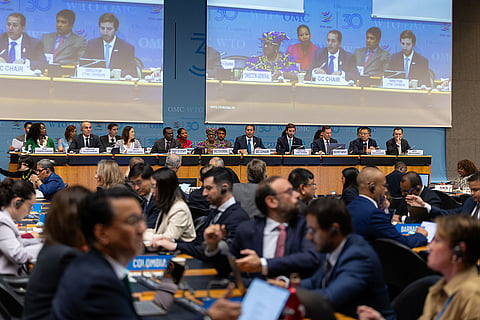

World Trade Organization agreement on fisheries subsidies enters into force, 15 September 2025.
Photo: WTO
The World Trade Organization (WTO) has confirmed that its Agreement on Fisheries Subsidies has officially entered into force after more than two-thirds of its members ratified the deal.
The announcement was made at a special General Council meeting in Geneva on 15 September, with Brazil, Kenya, Viet Nam and Tonga among the latest countries to submit their acceptance. Mali and Oman have also ratified the agreement and are expected to formally deposit their documents soon, the WTO said, joining the 111 countries which have already ratified.
The agreement establishes the first global trade rules designed to curb harmful fisheries subsidies, prohibiting subsidies that support illegal, unreported and unregulated (IUU) fishing, fishing activities targeting overfished stocks, and fishing in areas of the high seas that are not covered by a regional fisheries management organisation.
According to WTO estimates, governments worldwide spend around USD 35 billion each year on marine fishing subsidies, with USD 22 billion of this total considered to be harmful, directly contributing to the depletion of marine stocks.
The WTO described the treaty as a "historic achievement for the membership as the first WTO agreement to focus on the environment, the first broad, binding, multilateral agreement on ocean sustainability, and only the second multilateral agreement reached at the WTO since its inception."
WTO Director-General Ngozi Okonjo-Iweala hailed it as a “landmark for global trade governance”.
“This Agreement demonstrates how you can put trade in the service of both people and planet,” she said, adding, “At a time when the international trading system faces profound challenges, the Agreement on Fisheries Subsidies sends a powerful signal that WTO members can work together in a spirit of cooperation and shared responsibility.”
The WTO agreement aims to reverse the decline of global fish stocks while supporting food security and protecting the livelihoods of the estimated 260 million people worldwide who depend on fishing for income and employment. In 2021, 35.5% of global fish stocks were classified as overfished, compared to just 10% in 1974.
Ambassador Saqer Abdullah Almoqbel of Saudi Arabia, Chair of the WTO General Council, called the agreement “a testament to our shared vision for sustainable global fisheries” and praised the “collective resolve” of members to reach this milestone.
The deal was first adopted by consensus at the WTO’s 12th Ministerial Conference in June 2022. Following its entry into force this month, a Committee on Fisheries Subsidies will be created to monitor compliance, review members’ notifications on their subsidy programmes, and promote greater transparency by making information available to the public.
WTO members will be required to report details of their fishing subsidies, as well as data such as fish stock levels and conservation measures in place.
To help countries meet their obligations, the WTO has launched the WTO Fish Fund, which will provide financial and technical support to developing and least-developed countries. Seventeen members have pledged over USD 18 million to the fund, which is now accepting project proposals.
Members who have not yet ratified are being encouraged to do so before the World Trade Organization's next Ministerial Conference in March 2026. The WTO claims that, once fully implemented, the agreement will not only protect ocean resources but also free up billions of dollars that governments could redirect towards sustainable fisheries management and conservation efforts.
